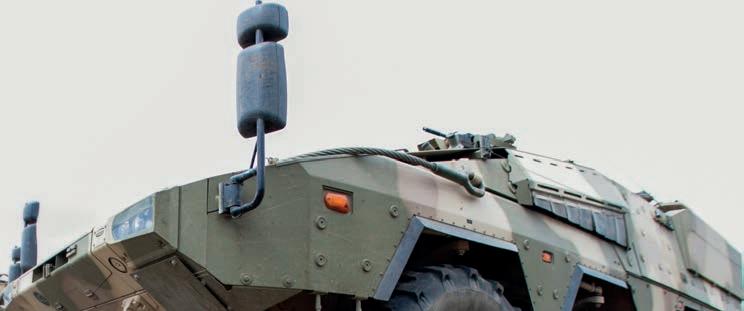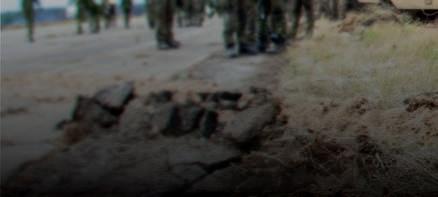
10 minute read
ADF health partnerships should be the
ADF health partnerships should be the next step in Australia’s Pacific step-up
The Australian Defence Force has long had an important role in providing humanitarian assistance to Pacific island countries. The force has extraordinary capabilities—people, expertise, training and equipment— in delivering assistance quickly and efficiently. The ADF is one of our most important agencies in helping our Pacific islands partners develop capabilities to address a range of security challenges.
Advertisement
My new report for ASPI, Next step in the step-up, released 8th April, looks at ways in which the ADF can build health security in the Pacific as part of a new phase in Australia’s Pacific step-up.
The community health needs of Pacific island countries will grow significantly in coming years as they endure ever more natural disasters. Climate change is likely to cause ongoing stresses to island health systems through extreme weather events, increased diseases, reduced water quality, heatwaves and population displacement. Calls for assistance from Australian civil and military organisations will almost certainly grow ever louder.
Many countries rely on the unique capabilities and expertise of militaries to provide humanitarian assistance. With assets such as ships, planes and trucks and expert personnel, military organisations are often best placed to deliver food, logistic support, engineering assistance and emergency medical services, especially in times of crisis.
The provision of medical assistance to communities in need is seen as a particularly important way of ‘winning hearts and minds’. Socalled medical diplomacy can involve short-term relief, such as responding to disasters, or long-term measures to
RAAF Dentist Squadron Leader Alistair Soon provides dental advice to a patient at the Bowali Primary School during Pacific Angel 19-4, held in Lae, Papua New Guinea.
build capabilities.
The US military is often at the forefront of assistance efforts as an integral part of US humanitarian assistance and disaster relief missions.
The United States, and now China, are also increasingly using naval hospital ships to deliver military health assistance. These gleaming white ships certainly capture the imagination. Indeed, who wouldn’t be impressed with the idea of a floating hospital, fully staffed and with access to all the latest technology, anchored off a tropical island, delivering the medical services to (hopefully, grateful) locals?
But using militaries to deliver health services is also subject to a lot of criticism. ‘Drive-by medicine’ by military health professionals on brief visits can do more harm than good, including by undercutting and discrediting local health providers and providing treatments that can’t be sustained. Importantly, they rarely buildlocalcapabilitiesorrelationships.
For these reasons, the ADF is rightly cautious about providing health assistance. ADF personnel regularly provide logistics and engineering assistance following natural disasters, including in humanitarian assistance and disaster relief operations in countries such as Fiji, Papua New Guinea, Niue, Samoa, Solomon Islands, the Philippines and Vanuatu. But since 2007 the ADF hasn’t provided health assistance as part of those operations.
This has led to the underutilisation of Australia’s military health capabilities in the Pacific. Important opportunities to reinforce regional partnerships aren’t being pursued.
The ADF is well placed to support the rollout of Covid-19 immunisation programs through transport and logistical support to Pacific island countries, as part of delivering on the vaccination initiative announced at the recent Quad leaders’ meeting. We’ve seen that in recent weeks in PNG.
But the ADF can also play an important long-term role in building health capabilities, while also avoiding the problems traditionally associated with military health assistance. The government should consider a new role for the ADF in the Pacific through developing mutually beneficial enduring military health partnerships.
This would involve the rotation of ADF health professionals through partner hospitals where they would have the opportunity to gain unique frontline experience from local experts, while also sharing their own knowledge and skills with local clinicians. The aim would be to build experience and training for both sides as part of an enduring institutional relationship.
Each one-month rotation would comprise ADF clinicians of different specialties, so, although the ADF presence would endure, no clinical specialty would always be present. ADF clinicians wouldn’t bring equipment or consumables to avoid interfering in the hospitals’ own supply chains.
For the ADF, the costs of rotating deployments of relatively small numbers of permanent and reserve personnel could be managed as part of overall training costs.
This would not be traditional humanitarian assistance, but would be a true partnership, filling a major gap in the ADF’s training needs while also delivering lasting benefits to our Pacific neighbours.
It would also be a big benefit to Australia. Our effective withdrawal of ADF health assets from humanitarian assistance and disaster relief operations since 2007 has left the force’s clinical staff with few overseas operational roles. The competencies required for field-deployed health care, for example, in treating tropical

Australian Aid arrives in Fiji on a RAAF C17-A Globemaster aircraft. Defence is providing support to the Government of Fiji following Tropical Cyclone Yasa, as part of a co-ordinated Australian Government response. 2016
diseases and in lifesaving ‘damage control’ surgery, can’t easily be acquired in the Australian civilian system. That leaves an experience gap.
As a result, many ADF clinicians lack experience and mentorship from working in small, remote hospitals in the context of a high prevalence of trauma and infectious disease. Yet those are exactly what ADF field hospitals must deal with in a military contingency. In contrast, many medical colleagues in the Pacific islands are experts in those areas. This means that ADF clinicians may miss important training opportunities necessary to properly fulfil their military roles.
It’s also a question of recruitment and retention. Many health professionals join the ADF, as either permanent or reserve personnel, with a view to helping those in need in our region. Current policies effectively deny them the opportunity to serve in the region as ADF members.
There are important opportunities here. An enhanced role for the ADF in regional health security, properly structured, might ultimately come to be seen alongside the Pacific patrol boat program as a successful example of mutually beneficial partnerships between the ADF and our Pacific neighbours.
David Brewster ASPI Strategist

Royal Australian Navy doctor, Commander Darren Delaney provides vital medical treatment during a Bougainville community health engagement as part of Pacific Partnership 2015. Defence images.
Astute PTY: A Story of Design, Fulfillment & Support
Four years on since Astute Electronics PTY Ltd gained a permanent footing in Australian soil, we look back at how this challenger brand grew into a leading value-add partner to the world’s largest defence primes
When Geoff Hill establishedAstute Electronics Ltd in the UK over 30 years ago he aimed to build a highly customer-centric organisation to support his Defence customers.
Geoff used three words to sum up how Astute Electronics would differ to other broadline distributors: design, fulfillment, and support. This phrase quickly established the Astute modus operandi.
Recognising the key differentiators of aerospace & defence projects - balancing the latest technology with proven longevity, reliability, and toughness - and understanding the critical nature of this work, propelled Astute Electronics towards the top of defence procurement.
Nearly three decades later, Astute Electronics PTY Ltd (Astute PTY) was launched out of this continuing commitment to its key customers, in particular BAE Systems.
Established in Melbourne, Victoria to support the global defence equipment manufacturers and their sub-tier supply chains, Astute PTY enjoyed a very focussed and personalised start with their Sales & Marketing Director, Mark Shanley, making frequent expeditions across the globe to identify and support new business.
In January 2018, Nick Molloy, General Manager ANZ, took the lead in supporting the supply agreement to BAESystems,promotingthebusiness and gaining traction with new defence primes and sub-tier providers. A year later Astute PTY moved into its current home - 65 Victor Crescent, Narre Warren, Victoria 3805 - to be closer to key customers and the Commonwealth Government.
From this location, Astute PTY brings the global supply-chain into Australia through a localised team who understands the complexities of supplying the ANZ markets.
Throughout 2019 Astute PTY continued to grow as they engaged with Defence primes on providing design, fulfillment and support. Astute PTY is strategically placed to deliver innovative solutions from a wide range of hand-picked franchised partners, providing advice on new component design-ins through the Astute ‘E-Design’ service. They can also leverage Astute’s market-leading counterfeit-mitigation process - ACAP - with access to the best of in-house test laboratories in the UK & USA as well as long-term storage capabilities.
In 2020 Astute PTY began to branch out into other sectors. Renel Ganancial looked after theAUS EAST (NSW/ACT/QLD) customer base ‘Defence Customers’, while Dave Collins supported the component supply needs of industrial customers with a focus on mining, construction, and transport.
Astute PTY has on average grown by more than 25% year on year. It’s proud to serve the needs of more than 40 active customers including the Australian Government, BAE Systems, Boeing Defence, Thales, Daronmont, Codan, and EM Solutions.
Since gaining a foothold in Australia they have been involved in a wide range of notable projects on behalf of the Australian Government (CIOG - KVM Switch; LNIC - DLAN – Jackstay), Boeing Defence (Currawong Program), and Daronmont Technologies (MCRC – Deployable Shelters).
Astute PTY is committed to closer involvement with design & engineering here in Australia to provide full turnkey solutions and support increase towards Australian Industry Content (AIC). There is strong desire is to developequivalentDesign,Fulfillment & Support capabilities as it’s UK and U.S. counterparts, comprising: • Franchised semiconductor, electromechanical, and power components • Technical support across franchised manufacturers and product categories • Traceable global component sourcing • Warehousing and Through-Life
Support • Obsolescence Management -
Proactive, LTBs, EOL, engineering support • Supply Chain Management / 3rd
Party Logistics
Astute PTY has enjoyed four very rewarding years of providing Design, Fulfillment & Support and remains very positive about its future in Australia.


DESIGN DESIGN DESIGN Design Engineering Resource Design Engineering Resource

Design Engineering Resource - Hi-Rel Franchised Distribution - Hi-Rel Franchised Distribution - Technical F.A.E Support - Engineering Value Clinics - 45+ Franchise Partners - Hi-Rel Franchised Distribution - Technical F.A.E Support - Engineering Value Clinics - Technical F.A.E Support - Engineering Value Clinics - 45+ Franchise Partners - 45+ Franchise Partners






Global Component Sourcing
Global Component Sourcing - Safe-Supply in a Volatile Marketplace - Safe-Supply in a Volatile Marketplace - Hard-to-find & Obsolescence Specialist - Quality-driven Distribution - International Procurement Offices - Safe-Supply in a Volatile Marketplace - Hard-to-find & Obsolescence Specialist - Quality-driven Distribution - Hard-to-find & Obsolescence Specialist - Quality-driven Distribution - International Procurement Offices - International Procurement Offices

PTY PTY PTY PTY
SUPPORT SUPPORT SUPPORT Through-Life Support Through-Life Support

Through-Life Support - Astute Counterfeit Avoidance - Astute Counterfeit Avoidance Programme (ACAP) - Obsolescence Management - Long-Term Storage (Nitrogen Storage) - Astute Counterfeit Avoidance Programme (ACAP) - Obsolescence Management Programme (ACAP) - Obsolescence Management - Long-Term Storage (Nitrogen Storage) - Long-Term Storage (Nitrogen Storage)

















